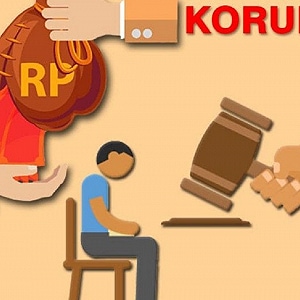In making a corruption case verdict, a panel of judges is authorized to impose additional penalties in the form of confiscation of the defendant’s property. The confiscated assets will be destroyed or under the control of the state.
However, in many cases, some of the assets confiscated from the defendant belong to third parties, who or that had nothing to do with the corruption cases. These third parties have the rights to take legal action based on Law No. 30/2002 on the the Commission for the Eradication of Criminal Acts of Corruption.
Article 19 Paragraph 2 of Law No. 30/2002 stipulates that a third party can file an objection to the Anti-Corruption Court where the corruption case is being heard, no later than two months after the court’s verdict is issued. Unfortunately, Law No. 30/2002 does not mention in detail how the objection is filed and what legal motion can be taken against verdicts by the anti-corruption court through its panel of judges.
In 2021, there was a sharp increase in the number of cases filed by third-parties against assets confiscated by the anti-corruption courts. These cases were largely filed by financial and securities management companies that were made third parties in many corruption cases.
In 2022, the Supreme Court issued the Supreme court Regulation (Perma) No. 2/2022 on the Procedures for Resolving Objections of Third Parties against the Verdict on the Confiscation of Goods Not belonging to the Defendant in a Corruption Crime Case.
Article 2 of Perma No. 2 /2022 stipulates that the court that has the right to accept the case of an objection by a third party is the court for criminal acts of corruption at the district court or military court which examines, hears and decides on the corruption case at the first level.
Article 3 Paragraph 2 of Perma No. 2/2002 stipulates that the third party that or who can file an objection is the owner, guardian, guardian of the owner of the goods, or the receiver in the case of bankruptcy of an item, either wholly or partly which is subject to confiscation. However, the receiver can file an objection request only if the decision on the declaration of bankruptcy is issued before the start of the investigation.
Based on Article 4 Paragraph 1 Perma No. 2/2022, objections must be submitted no later than two months after the court’s verdict on the corruption case is issued in a trial open to the public. Meanwhile, Article 4 Paragraph 2 of Perma No. 2 of 2022 stipulates that in the event that the corruption case is an appeal or cassation decision, the objection is submitted no later than two months after the excerpt/copy of the verdict is notified to the public prosecutor, the defendant and/or announced on the court notice board and/or electronically.
Based on Article 14 of Perma No. 2/2022, the submission of objections from third parties in good faith is free of charge.
After filing an objection by a third party, based on Perma No. 2/2022, the panel of judges will provide legal products to justice seekers in the form of determinations.
After the decision from the Corruption Court was issued, justice seekers were still given the opportunity to take other legal motion. Efforts that can be made against the determination of the court of first instance is to file a cassation, as stipulated in Article 15 paragraph 1 of Perma No. 2/2022.
The cassation registration must be accompanied by a cassation memorandum as stated in Article 16 Paragraph 2 of Perma No. 2/2022. If the cassation request is not accompanied by a memorandum of cassation, the clerk of the court shall make a statement addressed to the chief of the court. The chief of the court will declare that the determination of the cassation application unacceptable and the case file of the application will not be sent to the Supreme Court.
However, Article 20 of Perma No. 2/2022 states that against an appeal and/or determination of an objection that has permanent legal force, extraordinary legal motion or review (Peninjauan Kembali) cannot be submitted.
Therefore, based on Perma No. 2/2022, the last legal motion that can be taken for third parties with is an appeal.
Author / Contributor:
 |
Ikra Rhama, S.H., M.H, C.L.A
Associate Contact: Mail : ikra@siplawfirm.id Phone : +62-21 799 7973 / +62-21 799 7975 |
